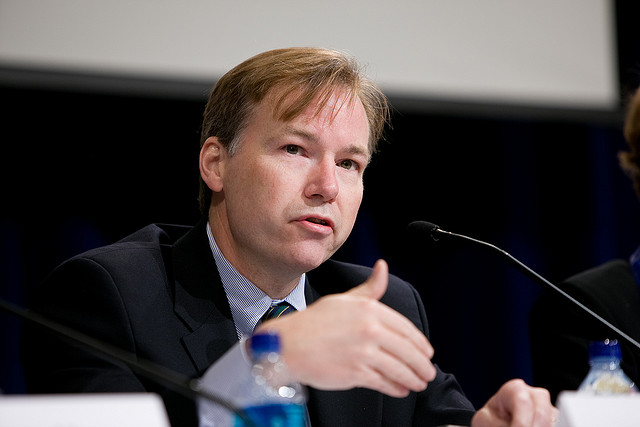
Steve Coll is a staff writer at the New Yorker and dean at Columbia's journalism school (Ralph Alswang/Flickr CC).
Big data. Twitter. Media startups. The way we all communicate and consume the news has changed significantly, and journalism schools are racing to keep up -- to teach their students the skills necessary in a rapidly shifting media landscape.
Last year, Columbia University's Graduate School of Journalism revamped its curriculum and students are now learning how to tweet and write code. Steve Coll is dean of the journalism school. WGBH's On Campus recently sat down with Coll to talk about professional higher education.
Highlights from the interview:
CARAPEZZA: You're at the top of your game. I'm wondering, how did you get there? And how do you think your successor will get there?
COLL: I studied journalism as an undergraduate, and I didn't go to graduate school. At a place like the Washington Post, if you were lucky enough to get in the door at 25 or 26, you could stay there, which I did for 20 years and never even really notice what was happening outside or in the economy and in changes in technology, and it's obvious that is not the world we are in now. The big institutions that used to do a lot of educating of young apprentice reporters don't have the means or position to do that anymore, so I think professional school is relatively more important now than it was twenty or thirty years ago.
CARAPEZZA: Over the past decade, law and medical schools have been reworking their curriculums... now journalism schools are making significant changes. Can you explain what's going on at these traditional, professional graduate programs?
COLL: At the journalism school, I think the effort is one continuous: you are constantly adapting and learning continuously. Secondly, always in the history of journalism, it's been necessary to synthesize the teaching of enduring values with new technologies. What you don't want to do is trap students into obsolescence by simply teaching them tools, nor can you only afford to teach them critical values, because they won't have experience with any practical tools, so finding a balance is the burden.
CARAPEZZA: How do you determine when a new skill is going to be a necessity or just a trend?
COLL: We need a dialogue, we need to be in touch with their profession because it is changing at a high rate of speed, and what I find is that these people are asking the same questions we are asking at school. It serves us both to talk to each other about what forms of excellence in journalism are starting to establish themselves in a durable way, what forms of change are fleeting…
CARAPEZZA: What lessons have you learned that you think can be applied to any graduate field of study trying to keep pace with changing demands in the workplace?
COLL: All successful professional graduate schools have simultaneously faced the university and their profession. A graduate school most enrich itself from the university to a substantial degree and equally it must do that while facing the profession.










